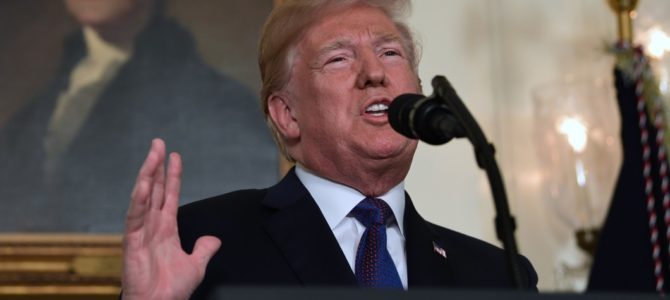President Trump has announced American air strikes against the Assad regime in Syria, in partnership with Britain and France. The airstrikes are for one night only, supposedly targeting the “heart” of Syria’s chemical weapons program, though the Department of Defense “acknowledged that the Syrian government most likely retained some ability to again attack its own people with chemical agents.”
Deterring chemical weapons use seems to be the one and only strategic purpose of the strike: “We are prepared to sustain this response until the Syrian regime stops its use of prohibited chemical agents.” So the United States and its allies are just enforcing the Geneva Convention prohibition against chemical weapons.
But this runs us up against the whole “win and go home” dilemma. In wanting to keep our mission in Syria very narrow—so he can authorize a single night of air strikes and declare “mission accomplished“—Trump is avoiding the task of forming the kind of larger, sustained strategy that actually produces results. Sen. Lindsey Graham gets it right on the short-range focus of this current effort.
Sen. Lindsey O. Graham (R-S.C.), an influential member of the Senate Armed Services Committee, said Saturday that the strikes reflected an overt policy decision to be ‘the chemical weapons police’ and no more.
‘The administration does have a strategy—and it’s to withdraw from Syria as quickly as possible,’ he said in a statement, critiquing a hands-off policy that he said would strengthen the hands of Russia and Iran, both key Syrian allies. ‘Ignoring the situation in Syria, simply saying—Not Our Problem—was a losing strategy when President Obama adopted it five years ago. And it’s a losing strategy still today.’
The reason we need a carefully chosen long-term strategy is that we’re trying to undo the consequences of the previous administration’s stubborn neglect of American interests. As President Trump noted, “In 2013, President Putin and his government promised the world that they would guarantee the elimination of Syria’s chemical weapons. Assad’s recent attack—and today’s response—are the direct result of Russia’s failure to keep that promise.”
Actually, it’s worse than that. The 2013 deal Obama made gave Russia a green light to become deeply involved in Syria, which it has done as an ally and sponsor of the brutal regime, giving it a foothold in the Middle East that Russia had never had before, even during the Cold War. Here’s why that’s going to be a problem.
In the days after the attack on Douma, the Syrian government and its Iranian and Russian allies got what they wanted—the rebel group that had been holding out there agreed to be evacuated. After its departure, Syrian and Russian troops arrived. It is unusual for Russian troops to take such a publicly visible role in patrolling Syrian government territory, and their presence can be seen as a warning to Washington against making a retaliatory attack in Douma….
Assad’s regime spent the week letting the world know that, in response to President Trump’s initial tweets about what a military response would entail, it had moved many of its assets to bases where Russian troops and planes are also located. Past attacks have avoided targeting Russians—and resulted in limited damages to facilities that are not as difficult to repair or replace.’
President Obama got us into this mess because he was always seeking an “off-ramp deal,” supposedly a deal designed to let everyone decrease the tensions, but actually a deal designed to allow him to pretend the crisis had passed and go back to ignoring Syria. Until the next crisis. Trump’s airstrike will prove inadequate if it is intended to accomplish the same thing.
A solution to the crisis in Syria—and its many negative effects on the United States, Europe, and the rest of the Middle East—will require a longer engagement than one night only.
Robert Tracinski is a senior writer for The Federalist. His work can also be found at The Tracinski Letter.









